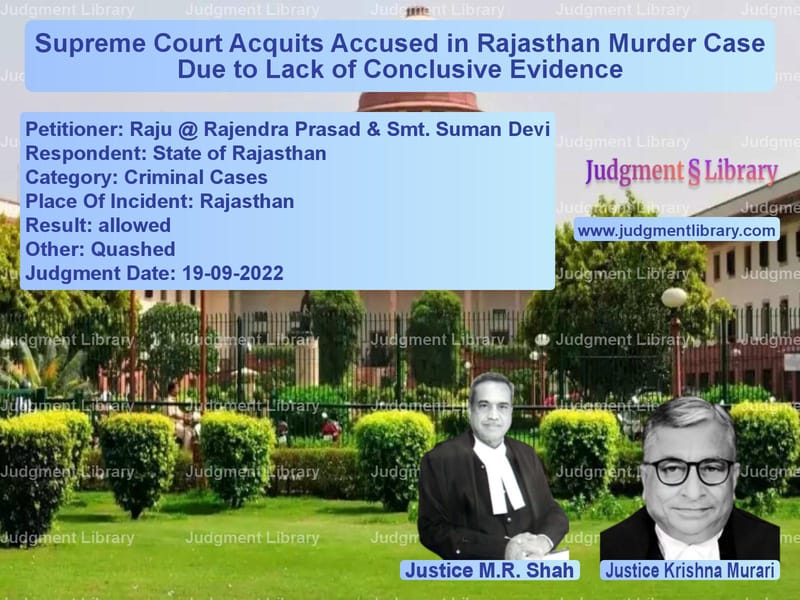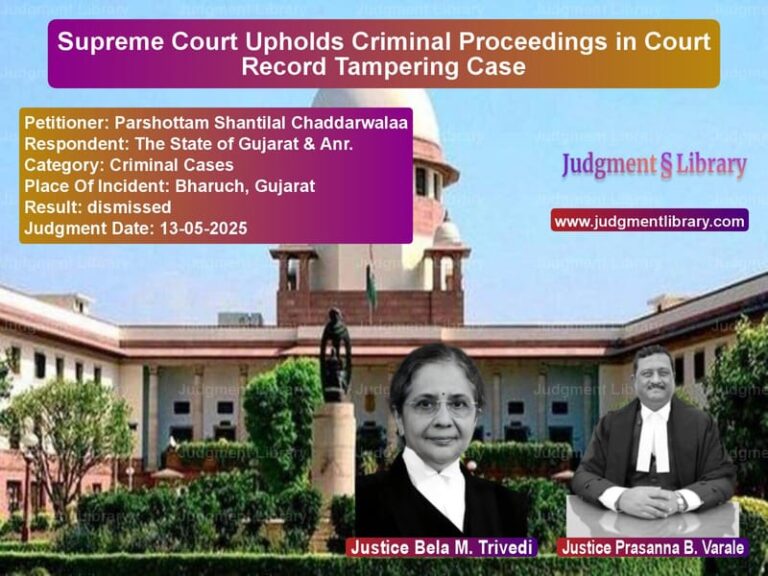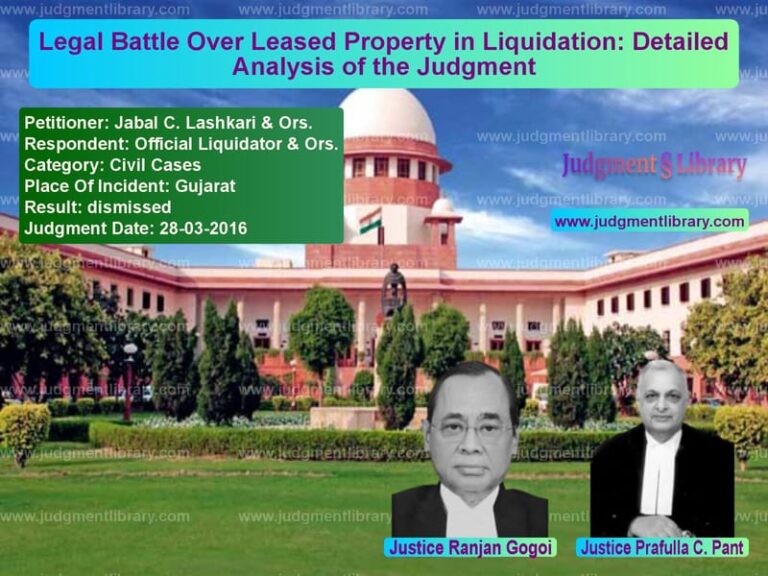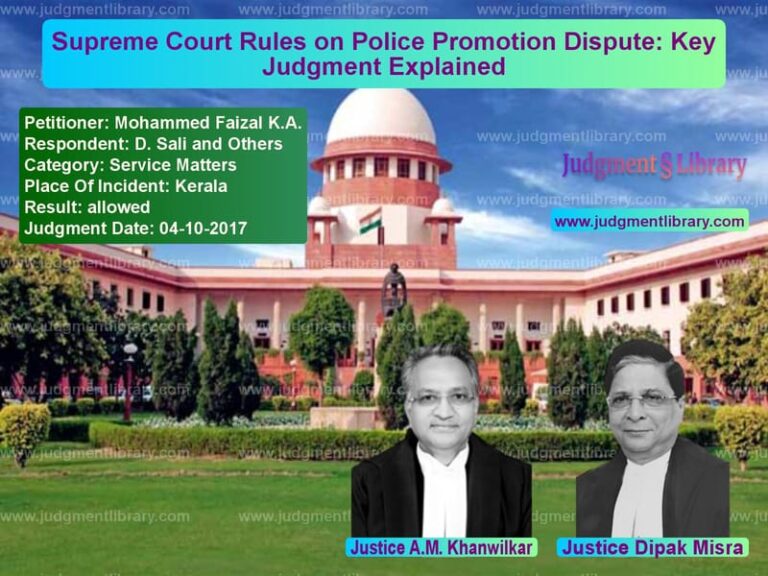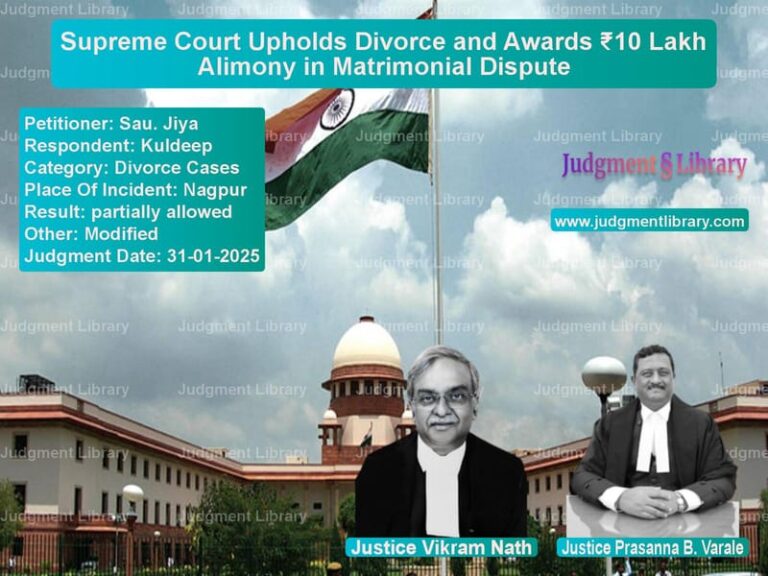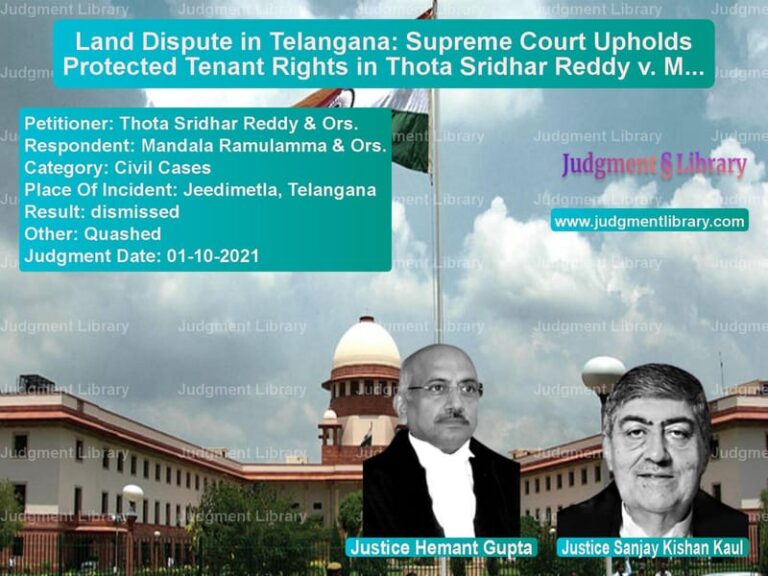Supreme Court Acquits Accused in Rajasthan Murder Case Due to Lack of Conclusive Evidence
The Supreme Court of India, in a landmark ruling, acquitted the accused in the case of Raju @ Rajendra Prasad and Smt. Suman Devi vs. State of Rajasthan. The decision, which reversed the conviction of the accused under Section 302 read with Section 34 of the Indian Penal Code (IPC), was based on the failure of the prosecution to establish a conclusive chain of circumstantial evidence proving guilt beyond a reasonable doubt. The ruling underscores the importance of ensuring that convictions are not based on weak or incomplete evidence and reaffirms the principles of criminal jurisprudence in India.
Background of the Case
The case revolves around the alleged murder of Narendra @ Goliya, whose body was found hanging from a tree. His brother, Prakash, filed a complaint alleging that Narendra was murdered by his wife, Suman Devi, in collusion with her alleged paramour, Raju @ Rajendra Prasad, and other family members. The prosecution contended that the murder was premeditated due to marital discord and illicit relations.
The trial court convicted the accused under Section 302 read with Section 34 IPC and sentenced them to life imprisonment. The Rajasthan High Court upheld the trial court’s verdict. However, the Supreme Court, after a detailed analysis, found that the conviction was unsustainable due to gaps in the prosecution’s case.
Legal Proceedings
Prosecution’s Case
The prosecution’s case was built on circumstantial evidence and included the following arguments:
- The accused had a motive for committing the crime as there were longstanding disputes between the deceased and his wife, Suman Devi.
- The key witness, PW-6, Shiwani (daughter of the deceased and accused Suman Devi), testified about ongoing quarrels between her parents.
- PW-7, Sunita (sister of Suman Devi), also corroborated claims of previous altercations.
- Medical evidence suggested that the cause of death was strangulation, contradicting the suicide theory.
Defense Arguments
The defense countered with the following arguments:
- There was no direct evidence linking the accused to the crime.
- PW-6 categorically stated that she did not witness her father being harmed.
- The prosecution failed to prove that the accused were last seen with the deceased before his death.
- The circumstantial evidence presented was incomplete, and alternative explanations for the death had not been ruled out.
Supreme Court’s Observations
The Supreme Court, led by Justice M.R. Shah and Justice Krishna Murari, closely analyzed the evidence and noted several deficiencies in the prosecution’s case.
1. Circumstantial Evidence Must Be Conclusive
The Court reiterated the well-established principle that in cases based on circumstantial evidence, the prosecution must establish a complete chain of events that leads to no other conclusion but the guilt of the accused. The Court observed:
“The circumstances, taken cumulatively, should form a chain so complete that there is no escape from the conclusion that within all human probability, the crime was committed by the accused and none else.”
2. No Direct Evidence or Last Seen Theory
The Court found that there was no direct evidence placing the accused with the deceased at the time of his death. The daughter, PW-6, did not witness any violence against her father and only discovered his death the next morning.
3. Incomplete Chain of Circumstantial Evidence
The prosecution failed to establish a link that conclusively proved that the accused alone could have committed the crime. The Court ruled that the absence of a clear sequence of events meant that the conviction was based on conjecture rather than hard evidence.
4. Alternative Possibilities Not Ruled Out
The prosecution failed to prove that the accused alone could have committed the crime. The gaps in evidence left room for reasonable doubt, making the conviction unsafe.
Precedents Cited by the Supreme Court
The Court cited several previous judgments that reinforced the principle that circumstantial evidence must lead to only one conclusion—the guilt of the accused. It referred to landmark rulings, including:
Read also: https://judgmentlibrary.com/supreme-court-dismisses-review-petition-in-madhya-pradesh-murder-case/
- Sharad Birdhichand Sarda vs. State of Maharashtra (1984) 4 SCC 116: Emphasized that circumstantial evidence must exclude every other possible hypothesis except that of guilt.
- Babu vs. State of Kerala (2010) 9 SCC 189: Reaffirmed that the prosecution bears the burden of proving a complete chain of circumstances.
- Krishnan vs. State (2008) 15 SCC 430: Stressed that courts must be cautious while convicting an accused solely on circumstantial evidence.
Supreme Court’s Final Verdict
The Supreme Court ruled in favor of the appellants, concluding:
- The accused were acquitted due to a lack of direct and conclusive evidence.
- The prosecution failed to establish a complete chain of events proving guilt beyond reasonable doubt.
- The accused were to be released immediately if not required in any other case.
Impact of the Judgment
The ruling has significant implications for criminal law, particularly in cases based on circumstantial evidence. It reinforces the principle that courts must exercise caution before convicting individuals in the absence of direct proof. The verdict also serves as a precedent to ensure that justice is not compromised due to weak prosecution.
Conclusion
The Supreme Court’s ruling in this case underscores the necessity of adhering to the highest standards of proof in criminal trials. By overturning the conviction, the Court has reaffirmed that legal principles cannot be compromised and that circumstantial evidence must be scrutinized rigorously before arriving at a verdict. This judgment is likely to influence future cases where circumstantial evidence plays a crucial role, ensuring that wrongful convictions do not occur in the absence of conclusive proof.
Petitioner Name: Raju @ Rajendra Prasad & Smt. Suman Devi.Respondent Name: State of Rajasthan.Judgment By: Justice M.R. Shah, Justice Krishna Murari.Place Of Incident: Rajasthan.Judgment Date: 19-09-2022.
Don’t miss out on the full details! Download the complete judgment in PDF format below and gain valuable insights instantly!
Download Judgment: raju-@-rajendra-pras-vs-state-of-rajasthan-supreme-court-of-india-judgment-dated-19-09-2022.pdf
Directly Download Judgment: Directly download this Judgment
See all petitions in Murder Cases
See all petitions in Bail and Anticipatory Bail
See all petitions in Attempt to Murder Cases
See all petitions in Judgment by Mukeshkumar Rasikbhai Shah
See all petitions in Judgment by Krishna Murari
See all petitions in allowed
See all petitions in Quashed
See all petitions in supreme court of India judgments September 2022
See all petitions in 2022 judgments
See all posts in Criminal Cases Category
See all allowed petitions in Criminal Cases Category
See all Dismissed petitions in Criminal Cases Category
See all partially allowed petitions in Criminal Cases Category

